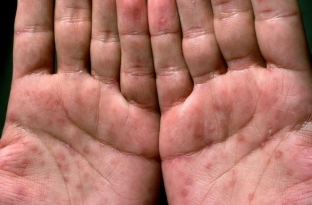Syphilis – a chronic systemic infectious disease with a cyclic undulating variable course, which is mainly transmitted sexually. Today, this disease is also considered by specialists as a co-factor contributing to HIV infection – infection and AIDS. The source of infection with this infection is a sick person, especially with contagious manifestations of syphilis. Infection occurs during direct contact with the patient or through objects on which there is infectious material. Treatment of syphilis is prescribed to the patient after the diagnosis is established.
What are the general principles for the treatment of syphilis?
Syphilis is currently considered to be completely curable if the treatment of syphilis started early and is complete. If treatment is started too late, only clinical recovery or stabilization of the infectious process is observed, notes estet-portal.com. Therapy for patients with syphilis should be comprehensive, and treatment for contact persons is also necessary.
The following treatments for syphilis are available:
- Specific Treatment – carried out only in patients with syphilis with a confirmed diagnosis.
- Preventive treatment given to prevent syphilis.
- Prophylactic treatment given to prevent congenital syphilis.
- Trial treatment for syphilis.

What is the specific treatment for syphilis?
The main drugs for the treatment of syphilis are penicillin drugs, divided into:
- Water-soluble preparations of penicillin – benzylpenicillin sodium salt, benzylpenicillin-G.
- Durant preparations of penicillin – benzathinebenzylpenicillin, bicillin-3, bicillin-5.
In case of intolerance to penicillin preparations, reserve antibiotics are used – tetracyclines, macrolides, cephalosporins.
When using penicillin drugs in the treatment of syphilis, side effects and complications may occur – urticaria, chills, arthralgia, angioedema, erythema multiforme, exfoliative dermatitis, anaphylactic shock, & nbsp; stomatitis, glossitis, superinfection. When using macrolides, nausea, vomiting, abdominal pain, flatulence, diarrhea are possible, rarely – allergic reactions, neutropenia, transient increase in transaminase activity. When using cephalosporins, diarrhea, anorexia, nausea, vomiting, candidiasis, headache, confusion, drowsiness, allergic reactions, neutropenia, leukopenia, reverse hypoprothrombinemia, transient increase in liver transaminase activity are possible.
Main aspects of non-specific treatment of syphilis
Non-specific treatment of syphilis is prescribed to stimulate the body's reactivity, increase resistance, activate the reticuloendothelial system, improve blood and lymph flow in the lesions, and increase the effectiveness of specific therapy.
The need to prescribe nonspecific treatment of syphilis occurs with latent late forms, syphilis of the nervous system and internal organs, congenital syphilis, with concomitant pathology, delayed negative seroreactions, serorelapses, seroresistance.
In the complex therapy of patients with syphilis, adaptogenic drugs are used – psentoprin, tincture of ginseng, lemongrass. Prescribe general tonic – autohemotherapy, endovascular laser therapy, blood irradiation with ultraviolet rays, as well as physiotherapy.
Immunocorrective therapy is prescribed in cases of “malignant” the course of the disease, in the presence of concomitant diseases that develop against the background of immunosuppression, as well as in patients suffering from chronic alcoholism. Such treatment of syphilis is recommended to be carried out under the control of immunograms.







Add a comment